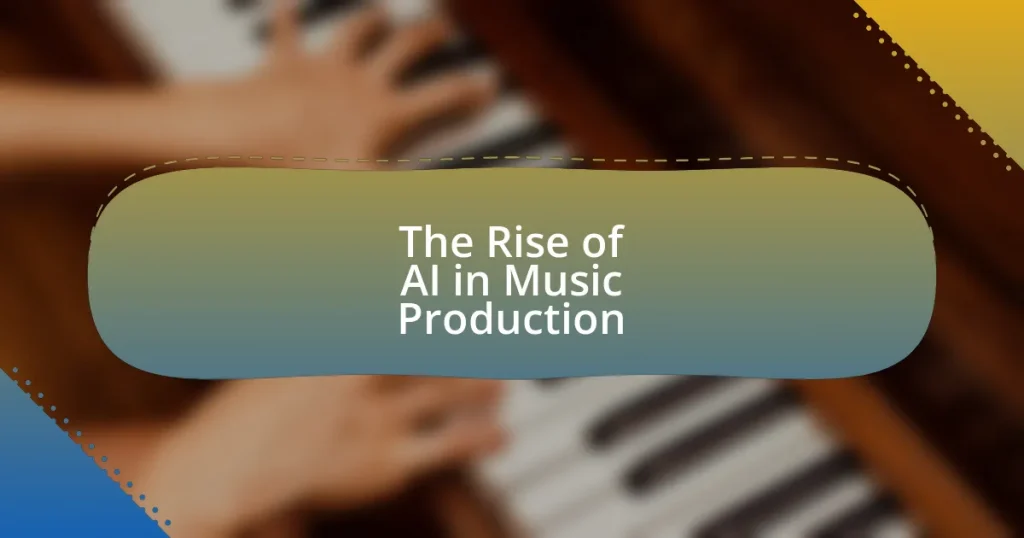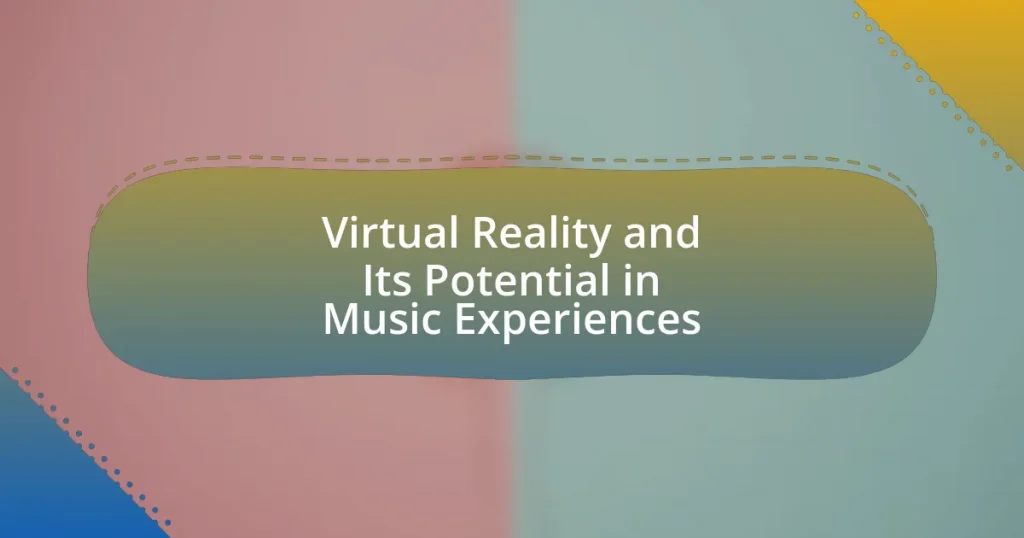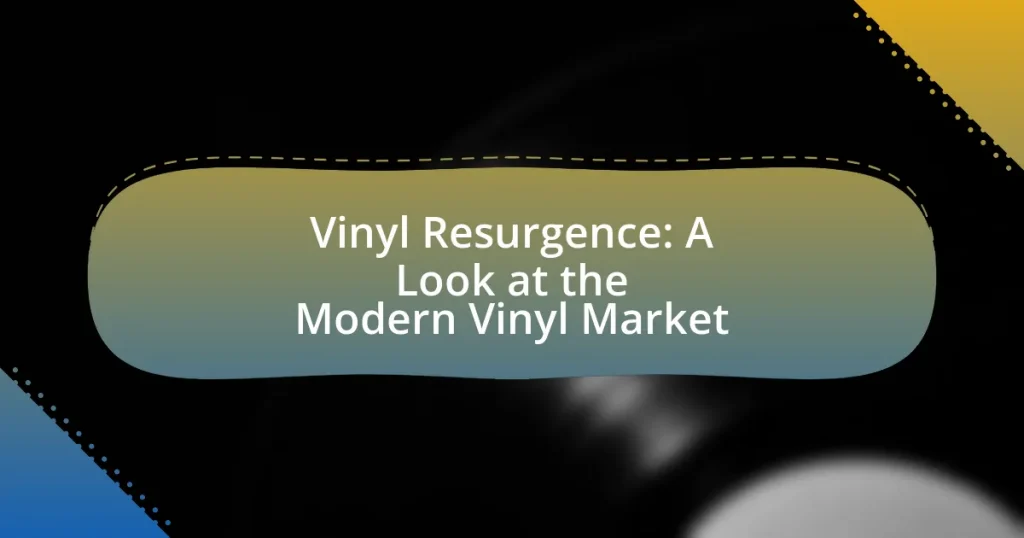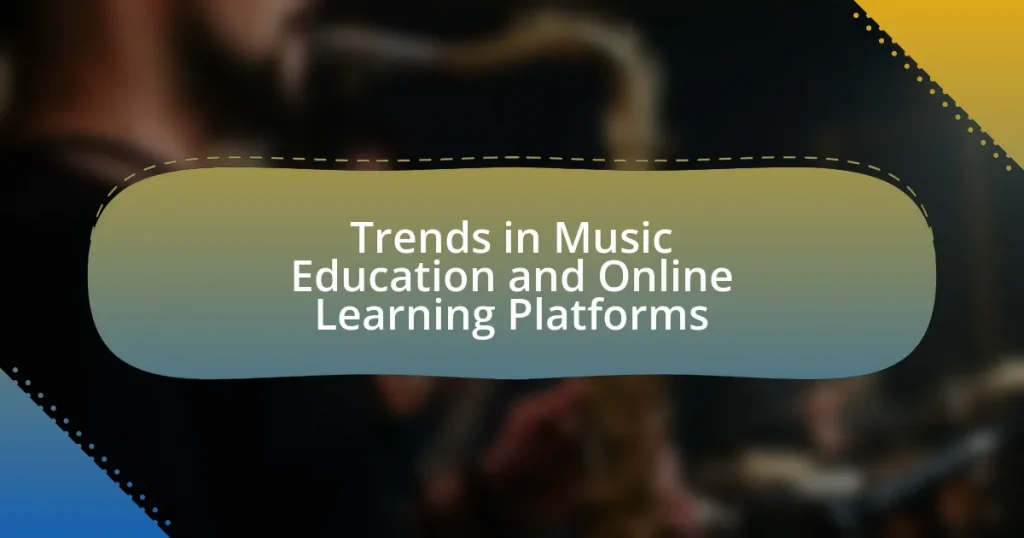The rise of AI in music production signifies the growing integration of artificial intelligence technologies in the creation, composition, and production of music. This trend is driven by advancements in machine learning, enabling AI systems to analyze musical data, generate original compositions, and assist in sound engineering. Key milestones in AI development include algorithmic composition, the introduction of AI music systems, and the emergence of deep learning techniques. AI enhances creativity and efficiency in music production, while also presenting challenges such as potential loss of originality and copyright concerns. The article explores the evolution of AI in the music industry, its impact on music creation processes, and the tools driving this transformation.
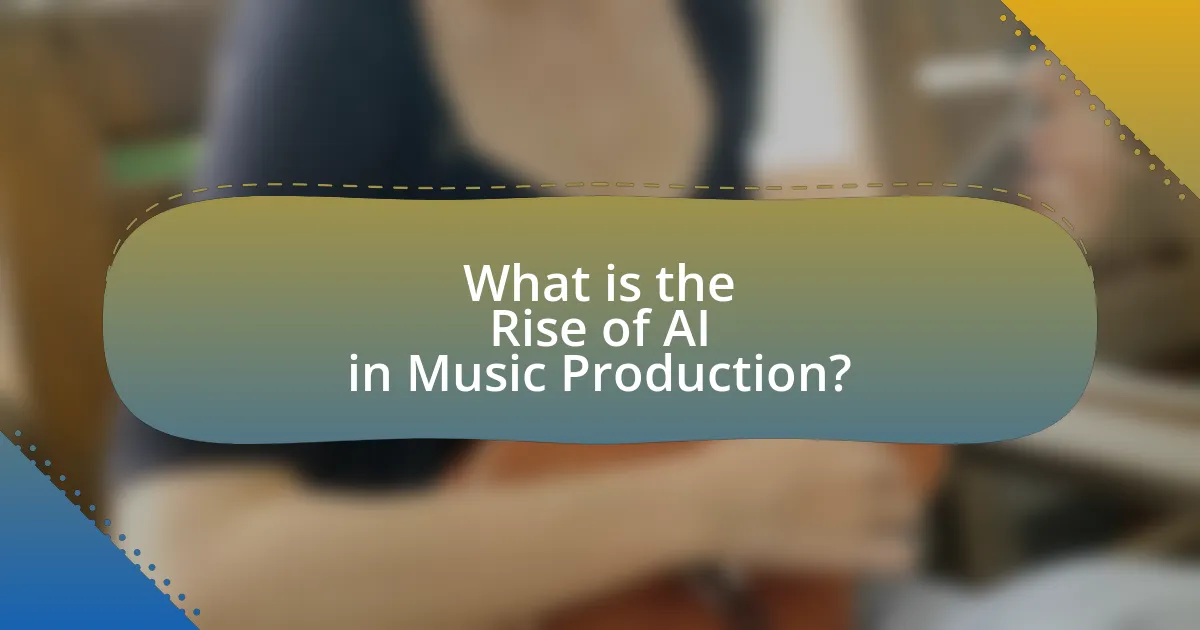
What is the Rise of AI in Music Production?
The rise of AI in music production refers to the increasing integration of artificial intelligence technologies in the creation, composition, and production of music. This trend has been driven by advancements in machine learning algorithms and data analysis, enabling AI systems to analyze vast amounts of musical data, generate original compositions, and assist in sound engineering. For instance, AI tools like OpenAI’s MuseNet and Google’s Magenta can compose music across various genres, demonstrating the capability of AI to mimic human creativity. Additionally, a report by the International Federation of the Phonographic Industry (IFPI) highlights that 61% of music creators are using AI tools to enhance their creative processes, indicating a significant shift in the industry towards embracing technology for music production.
How has AI technology evolved in the music industry?
AI technology has evolved significantly in the music industry by enhancing music creation, production, and distribution processes. Initially, AI was used for simple tasks such as music recommendation algorithms, but it has progressed to sophisticated applications like AI-generated compositions and real-time music analysis. For instance, platforms like Amper Music and AIVA utilize machine learning to compose original music tracks, allowing artists to collaborate with AI in the creative process. Additionally, AI tools now assist in mastering tracks, optimizing sound quality, and analyzing listener preferences to tailor marketing strategies. This evolution is evidenced by the increasing integration of AI in major music production workflows, demonstrating its transformative impact on how music is created and consumed.
What are the key milestones in AI development for music production?
Key milestones in AI development for music production include the introduction of algorithmic composition in the 1950s, the creation of the first AI music systems like EMI (Experiments in Musical Intelligence) in the 1990s, and the emergence of deep learning techniques in the 2010s that enabled advanced music generation. In 2016, Google’s Magenta project showcased the potential of machine learning in music creation, while OpenAI’s MuseNet, released in 2019, demonstrated the ability to compose complex music across various genres. These milestones highlight the evolution of AI from basic algorithmic processes to sophisticated systems capable of generating high-quality music autonomously.
How do advancements in AI impact music creation processes?
Advancements in AI significantly enhance music creation processes by automating composition, improving sound design, and facilitating personalized music experiences. AI algorithms can analyze vast datasets of existing music to generate new compositions that mimic various styles and genres, allowing artists to explore innovative sounds and ideas. For instance, tools like OpenAI’s MuseNet and Google’s Magenta utilize deep learning to create original music tracks, demonstrating AI’s capability to assist in the creative process. Additionally, AI-driven software can optimize mixing and mastering, ensuring high-quality sound production with minimal human intervention. This integration of AI not only streamlines workflows but also empowers musicians to focus on artistic expression while leveraging technology for efficiency and creativity.
Why is AI becoming essential in music production?
AI is becoming essential in music production due to its ability to enhance creativity, streamline workflows, and provide data-driven insights. The integration of AI tools allows producers to generate music, analyze trends, and automate repetitive tasks, significantly increasing efficiency. For instance, AI algorithms can analyze vast amounts of data to identify popular musical patterns, enabling artists to create more appealing tracks. Additionally, AI-driven software can assist in sound design and mixing, allowing producers to focus on the creative aspects of music-making. This shift towards AI in music production is supported by the growing adoption of AI technologies in various industries, indicating a broader trend towards automation and innovation.
What advantages does AI offer to music producers?
AI offers music producers enhanced creativity, efficiency, and data-driven insights. By utilizing AI algorithms, producers can generate unique sounds, automate repetitive tasks, and analyze listener preferences to tailor music more effectively. For instance, AI tools like Amper Music and AIVA allow producers to compose music quickly, reducing the time spent on initial drafts. Additionally, a study by the University of California, Berkeley, found that AI can analyze vast amounts of music data, helping producers identify trends and optimize their productions for better audience engagement.
How does AI enhance creativity in music composition?
AI enhances creativity in music composition by providing tools that assist musicians in generating new ideas, exploring diverse musical styles, and automating repetitive tasks. For instance, AI algorithms can analyze vast datasets of existing music to identify patterns and suggest novel chord progressions or melodies, thereby inspiring composers to experiment beyond their usual boundaries. Research by the MIT Media Lab demonstrates that AI systems like AIVA and OpenAI’s MuseNet can create original compositions that mimic various genres, showcasing the potential for AI to act as a collaborative partner in the creative process. This capability not only accelerates the composition workflow but also encourages artists to push their creative limits by integrating AI-generated elements into their work.
What challenges does the rise of AI in music production present?
The rise of AI in music production presents challenges such as the potential loss of creativity and originality in music. As AI systems generate music based on existing patterns and data, they may produce works that lack the emotional depth and unique expression characteristic of human-created music. Additionally, there are concerns regarding copyright issues, as AI-generated music can lead to disputes over ownership and intellectual property rights. A study by the European Parliament in 2020 highlighted the need for clear regulations to address these legal ambiguities, emphasizing the importance of protecting artists’ rights in an increasingly automated landscape.
How does AI affect the role of human musicians and producers?
AI significantly alters the role of human musicians and producers by automating various aspects of music creation and production. This technology enables tasks such as composition, mixing, and mastering to be performed more efficiently, allowing musicians to focus on creativity and artistic expression. For instance, AI algorithms can analyze vast amounts of musical data to generate new compositions or suggest arrangements, which can enhance the creative process. Additionally, AI tools like automated mixing software can streamline production workflows, reducing the time required for technical tasks. According to a report by the International Federation of the Phonographic Industry, the integration of AI in music production is expected to increase productivity and innovation in the industry, demonstrating its impact on the roles of human musicians and producers.
What ethical concerns arise from using AI in music production?
The ethical concerns arising from using AI in music production include issues of copyright infringement, the devaluation of human creativity, and the potential for bias in AI-generated content. Copyright infringement occurs when AI systems generate music that closely resembles existing works, leading to legal disputes over ownership and originality. The devaluation of human creativity is a concern as AI can produce music at scale, potentially overshadowing human artists and diminishing their economic opportunities. Additionally, bias in AI-generated content can arise from the datasets used to train these systems, which may reflect existing societal biases, resulting in music that lacks diversity and inclusivity. These concerns highlight the need for ethical guidelines and regulations in the integration of AI into the music industry.
How is AI transforming the music production landscape?
AI is transforming the music production landscape by automating various aspects of the creative process, enhancing efficiency, and enabling new forms of artistic expression. For instance, AI algorithms can analyze vast amounts of musical data to generate original compositions, assist in mixing and mastering tracks, and even provide real-time feedback to artists. A notable example is OpenAI’s MuseNet, which can compose music in various styles and genres, demonstrating AI’s capability to mimic human creativity. Additionally, AI tools like LANDR offer automated mastering services, significantly reducing the time and cost associated with professional audio production. This shift not only streamlines workflows but also democratizes music production, allowing more individuals to create high-quality music without extensive technical knowledge.
What specific tools and software are driving AI in music production?
Specific tools and software driving AI in music production include Ableton Live, Logic Pro X, and AIVA. Ableton Live integrates AI features for music composition and sound design, enhancing creativity and workflow efficiency. Logic Pro X utilizes AI-driven smart features for audio editing and arrangement, streamlining the production process. AIVA, an AI composer, generates original music based on user-defined parameters, showcasing the capabilities of AI in creating complex compositions. These tools exemplify the integration of AI technology in modern music production, significantly influencing how music is created and produced.
How do these tools integrate with traditional music production methods?
AI tools integrate with traditional music production methods by enhancing creativity and efficiency in the workflow. These tools, such as AI-driven composition software and automated mixing systems, allow producers to generate ideas quickly, analyze sound patterns, and optimize audio quality, which complements the hands-on techniques of traditional methods. For instance, AI can assist in arranging tracks or suggesting chord progressions, thereby streamlining the creative process while maintaining the human touch essential in traditional music production. This integration is evident in the use of AI algorithms that analyze historical music data to inform production choices, demonstrating a blend of technology and artistry that enriches the overall music-making experience.
What features make these AI tools popular among producers?
AI tools are popular among producers primarily due to their ability to enhance creativity, streamline workflows, and provide advanced analytics. These tools offer features such as automated mixing and mastering, which save time and improve sound quality, allowing producers to focus on artistic elements. Additionally, AI-driven composition tools can generate unique melodies and harmonies, expanding creative possibilities. The integration of machine learning algorithms enables personalized recommendations based on user preferences, further enhancing the production process. According to a 2022 survey by the Music Producers Guild, 75% of producers reported increased efficiency and creativity when using AI tools, highlighting their significant impact on modern music production.
What are the future trends of AI in music production?
The future trends of AI in music production include enhanced automation, personalized music creation, and improved collaboration tools. Enhanced automation will allow AI to handle repetitive tasks such as mixing and mastering, which can significantly reduce production time. Personalized music creation will enable AI to analyze listener preferences and generate tailored compositions, as seen in platforms like Amper Music and AIVA, which use algorithms to create unique tracks based on user input. Improved collaboration tools will facilitate remote teamwork among artists and producers, leveraging AI to suggest harmonies, melodies, and arrangements, thereby streamlining the creative process. These trends are supported by advancements in machine learning and neural networks, which continue to evolve, making AI an integral part of the music production landscape.
How might AI shape the future of music genres and styles?
AI will significantly shape the future of music genres and styles by enabling the creation of new sounds and compositions that blend existing genres. Through machine learning algorithms, AI can analyze vast amounts of music data, identifying patterns and trends that can inspire innovative genre fusions. For instance, AI-generated music has already led to the emergence of sub-genres like lo-fi hip-hop and AI-assisted pop, which combine elements from various styles to create unique listening experiences. Additionally, AI tools like OpenAI’s MuseNet and Google’s Magenta have demonstrated the ability to compose original pieces that reflect diverse influences, showcasing the potential for AI to redefine musical boundaries and encourage experimentation in music production.
What predictions can be made about AI’s role in live music performances?
AI is predicted to significantly enhance live music performances through real-time data analysis, audience interaction, and personalized experiences. By utilizing machine learning algorithms, AI can analyze audience reactions and adapt performances accordingly, creating a more engaging atmosphere. For instance, AI-driven systems can modify setlists based on crowd energy levels, as evidenced by experiments conducted at festivals where AI tools adjusted performances in real-time based on audience feedback. Additionally, AI can facilitate virtual collaborations between artists, allowing for innovative performances that blend various musical styles and genres, as seen in projects like YACHT’s “Chain Tripping,” which utilized AI to create music collaboratively. These advancements indicate that AI will play a transformative role in shaping the future of live music experiences.
What practical tips can producers follow to effectively use AI in music production?
Producers can effectively use AI in music production by integrating AI tools for composition, sound design, and mixing. Utilizing AI-driven software like AIVA for composition can enhance creativity by generating unique melodies and harmonies based on user input. Additionally, employing AI plugins such as iZotope Ozone for mastering can streamline the mixing process, providing intelligent suggestions for EQ and dynamics based on the track’s characteristics. Furthermore, leveraging AI for data analysis can help producers understand listener preferences and trends, allowing for more targeted music creation. These practices are supported by the growing adoption of AI technologies in the industry, with a report from the International Federation of the Phonographic Industry indicating that 60% of music producers are exploring AI tools to enhance their workflow.










